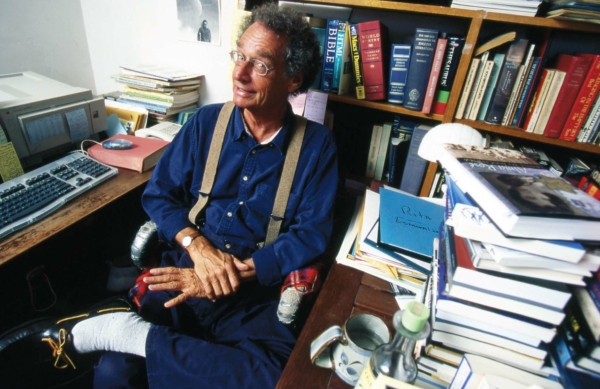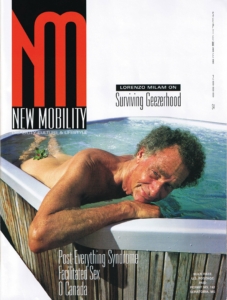
Lorenzo Wilson Milam, a polio survivor known widely for creating community radio stations that featured the work of non-mainstream writers, musicians and thinkers, died at his residence in Oaxaca, Mexico, on July 19. Longtime New Mobility readers knew him as the colorful author of CripZen: A Manual for Survival, as well as an articulate book reviewer and a frequent contributor of thought-provoking essays and stories based on his life. At the time of his death, he was still actively promoting his 2018 book manuscript, Life Among the Walkies. He was 86.
“Brilliant writer, needs little editing, if any. Loves to tell lies.”
 That succinct statement could have served as Milam’s epitaph, but in fact it was former NM editor Barry Corbet’s assessment of Milam as a freelancer, which he delivered to his successor when he retired. Corbet and Milam enjoyed a long personal and professional friendship that culminated in a lively cover story on Surviving Geezerhood, for which Milam posed nude to bring home one of his key points: “Crips need absolutely outrageous naked honesty. Honesty that’s so profound that it makes you want to lie about it,” he said. “And I think that along with religion and the need to be curious and constantly learn new things, honesty has been one of the keys to my survival.”
That succinct statement could have served as Milam’s epitaph, but in fact it was former NM editor Barry Corbet’s assessment of Milam as a freelancer, which he delivered to his successor when he retired. Corbet and Milam enjoyed a long personal and professional friendship that culminated in a lively cover story on Surviving Geezerhood, for which Milam posed nude to bring home one of his key points: “Crips need absolutely outrageous naked honesty. Honesty that’s so profound that it makes you want to lie about it,” he said. “And I think that along with religion and the need to be curious and constantly learn new things, honesty has been one of the keys to my survival.”
Milam was born Aug. 2, 1933, in Jacksonville, Florida, to Robert, a lawyer and real estate investor, and Meriel, a homemaker. He was one of seven siblings. In Life Among the Walkies, he described his singular role in the Milam hierarchy of siblings: “I was designated the family blab. I learned that there was a payoff in being an investigative reporter, so no secret was safe in my hands. If anyone broke the unspoken rules, I would make sure that every one knew … unless blackmailed to do otherwise. I had a field day with outright lies, especially my own, for I found that if I generated enough background noise, I could continue to pretend to be safe.”
Perhaps that was an early confession of what came to be another major theme in his writing as a polio survivor: vulnerability. (It should be noted that one of his sisters died from polio.) That theme, along with naked honesty, were the hallmarks of at least two of his best-known books — The Cripple Liberation Front Marching Band Blues, and CripZen, the latter having been described as “… funny, wise and elegantly written” by Geoffrey C. Ward, author of The Emergence of FDR. “No one, disabled or not, should miss it.”
Milam had the good fortune to have been one of the early residents of FDR’s groundbreaking rehab facility, Warm Springs, in 1953. For the first six months of his initial battle with polio, Milam had been locked away in a small, poorly staffed facility that drove home the prevailing notion that paralysis was like a prison sentence. Later he described the uplifting contrast of being given a new kind of life to explore, along with his fellow residents, at Warm Springs: “We had come from dingy little hospitals all over the country and suddenly we were in the palace of the gods — with good and dedicated physical therapists and support staff, a graceful campus, wonderful food: a place that changed forever our feelings about ourselves, and our disease, and the man who made this paradise possible,” he wrote in Life Among the Walkies.
Besides writing several books and many articles, Milam founded and published The Fessenden Review, a literary journal, which later became RALPH: The Review of Arts, Literature, Philosophy and the Humanities, an online book review magazine.
While Milam will be remembered nationally as a pioneering proponent of public radio — he is credited with starting up at least 12 FM radio stations — for those of us in the disability community, his legacy is his writing about the personal struggle of living in a paralyzed body from a young age. He never shied away from documenting his grief, anger and depression, but he managed to balance the pain with a profound joie de vivre embodied in his love of travel and many rich relationships. Ultimately, his work leads readers to understand disability as a valuable part of the whole person, and of the human experience.
** This post was originally published on https://www.newmobility.com/2020/08/lorenzo-milam-1933-2020/

